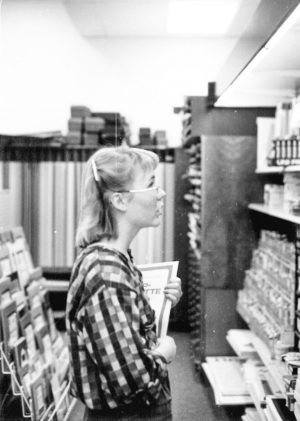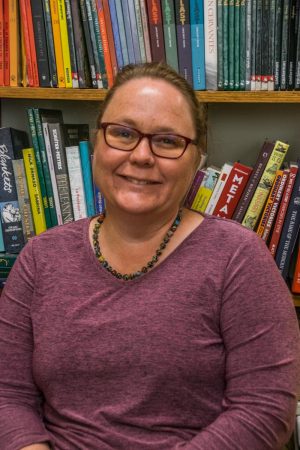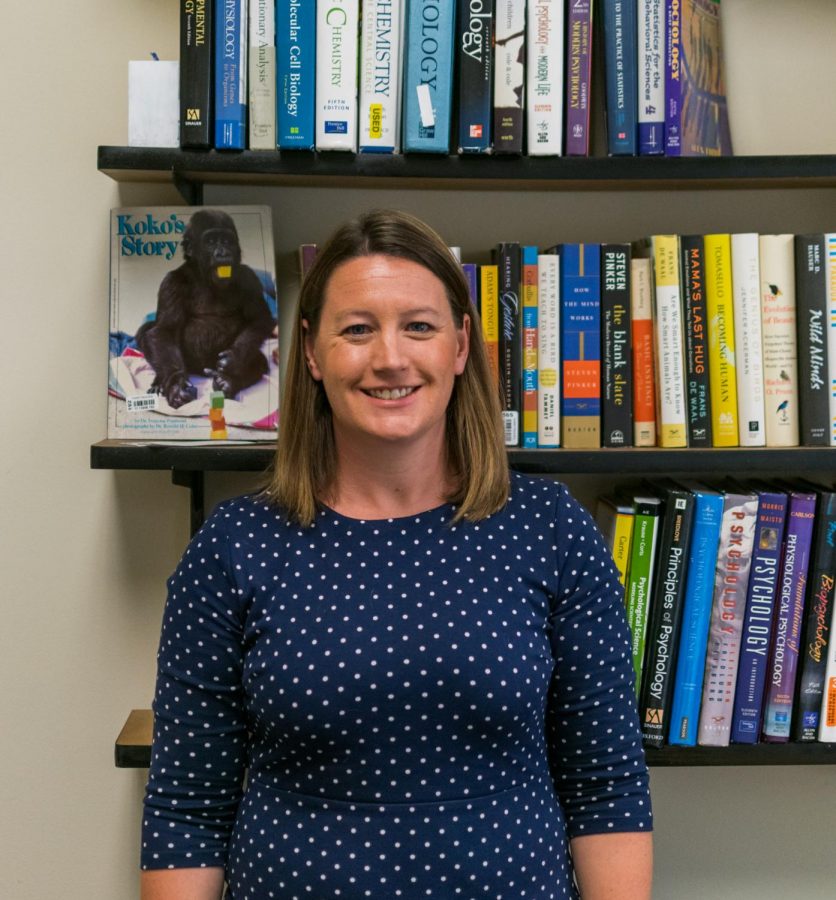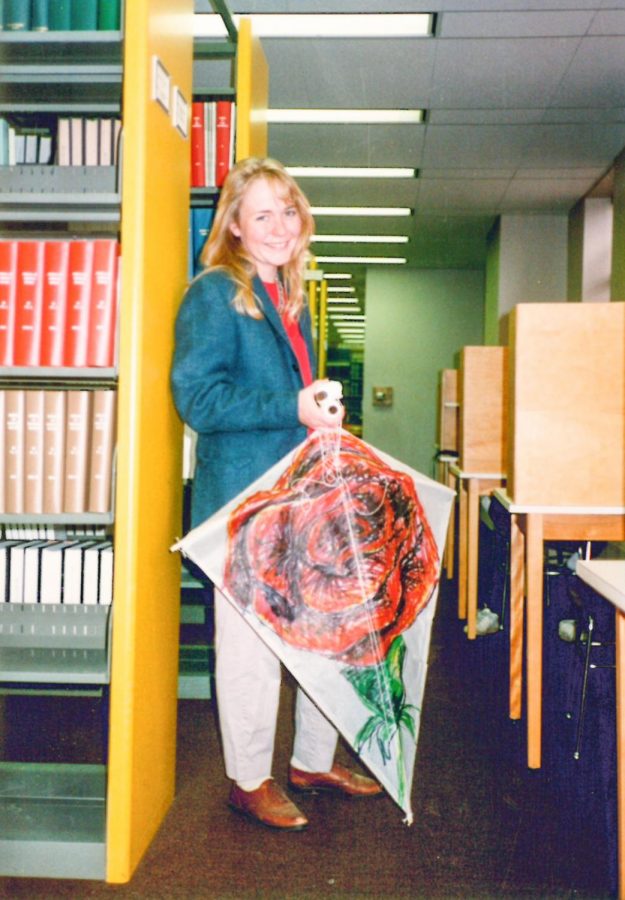Journey back to the alma mater: Whitman alumni return as professors
Associate Professor of Foreign Languages and Literatures Sarah Hurlburt, as a student, searches for a friend to fly her homemade kite in the library. Photo contributed by Sarah Hurlburt
October 31, 2019
Being the tight-knit and relatively self-selective institution that Whitman is, it is no surprise that a number of graduates from throughout the years have decided to come back as faculty.
Many professors are drawn back to Whitman for a combination of reasons, such as the practicalities of a limited amount of professorial jobs elsewhere, the rural setting or nostalgia for their time at Whitman.
Associate Professor of Foreign Languages and Literatures Sarah Hurlburt, who graduated from Whitman in 1991, is one such person.
Arriving at Whitman from the small town of Tuley Lake, California, Hurlburt majored in French and studio art, describing her experience arriving at Whitman as a “brain explosion,” especially coming from such an isolated background. Her high school graduating class consisted of 25 students.

Hurlburt now teaches French at Whitman.
Whitman’s intellectual environment and the rural setting made it an ideal place for Hurlburt to return to.
“For me, living in Walla Walla and having this intellectual environment, but in a context where you are right next to the mountains, right next to the fields, where you can also have a rural environment, is the perfect mix,” Hurlburt said.
Many things about the school have changed since she was a student here. For one, the facilities have been greatly improved. This change has come in parallel with the development of Walla Walla as a whole, where she was greatly involved off campus during her time as a student.
“This is a different Walla Walla from when I went to school,” Hurlburt said. “There were maybe three businesses open in Walla Walla downtown and the old mall was still where … there is the new mall. But the downtown of Walla Walla was just a wasteland, almost no businesses, certainly no place to go, almost nothing to do.”
For Hurlburt, Whitman during the years she was a student here differ from how the campus is currently, but not necessarily because of any institutional intention — the world around it has changed just as much as Whitman has.
“Whitman has changed a lot, but the world has also changed a lot,” Hurlburt said. “There are a lot of things that are really central to our campus conversations now that were barely beginning to be acknowledged in those years.”
For example, sexual assault, only just beginning to be recognized when she was a student at Whitman, is now talked about frequently, especially in relation to the fraternities and sororities. Sexual Violence Prevention representatives have been initiated in these groups as part of an effort to reduce incidents of campus sexual violence.
Clubs and activities have increased due to the decreased monolithic presence of the Greek system and these clubs have much more support by the college than when she was a student.
Diversity is also a noted difference. Both international student diversity as well as diversity of students coming from different regions in the U.S. have increased significantly.
“When I went to Whitman in ’91, this was still a regional school,” Hurlburt said. “There would be a few people from outside the region, but not a lot. The balance of where our students are coming from is much better now.”

Associate Professor of Foreign Languages and Literatures Sarah Hurlburt
For Hurlburt, the way that the diversity issue affected her was that she came from a very isolated community. Though she was not a first generation student, socioeconomically she felt cut off from immediate peers. This led to her time at Whitman being partly a memory of feeling isolated, but also of how she came to do art while working at the Walla Walla Foundry and having friends in town. These things became anchor points for a more well-rounded life that she sought outside of Whitman’s campus.
Hurlburt said she was terrified to come back. Though Whitman has changed, and though she also is not the same person who went here many years ago, there are many things about the campus experience that have not changed.
It was Whitman’s commitment to an intimate and exploratory liberal arts education which has continued to this day, however, that hooked her in the first place.
It was also the importance of relationships. She remembers majoring in French not because she loved French and knew she wanted to do it, but because of a faculty member.
“Now, I’ve made my own life here,” Hurlburt said. “I have a family here; I have a really big garden and that’s a really positive connection for me.”
Hurlburt’s garden reminds her both of her own grandmother and friends from town who were big gardeners. She joked that she was bossed around by these women, but in truth those connections have allowed her to ground herself outside of school, seeking that balance.
Hulburt looked back on her Whitman experience with mixed feelings.
“This school … I don’t have a un-critical love of it, but I do have a love of it,” Hulburt said. “And I haven’t always had good experiences here, but that’s life, that’s not just Whitman.”
For Assistant Professor of Psychology Nancy Day, who graduated from Whitman in 2005, the differences between then and now are not as greatly perceptible. Day has a love of Whitman stemming from the time she spent here as a student more than a decade ago.
“Whitman is near and dear to my heart because I really treasured the time here I had as a student,” Day said. “So when the opportunity to be on the other side was presented and offered, I couldn’t help but want to go back to the place that I loved.”
Day described her time at Whitman as a student as busy. Both of her majors, biology and psychology, required a senior thesis as well as written and oral exams, resulting in a jam-packed senior year that has stuck in her memory.
Though while on campus her campus involvement revolved around her coursework, off campus she was involved greatly in the community. Day was as a Girl Scout troop leader with another Whitman student for two troops at Assumption Elementary School and Walla Walla High School. Through these involvements, she was able to get off campus regularly. Coming back to Walla Walla has allowed her to reconnect with some of the Girl Scouts she mentored that still live in town, the youngest one having recently graduated from college.
For Day, it was nice to be involved in the community more than just on campus. Spending time off campus was a way to get a different feel for the town; she does not think she would have appreciated the town as much as a student had she not been so involved.
The close relationships Day formed with professors was another valuable aspect of her student experience.
“I’m sure that there were things that were horrible and awful that I chose not to remember and so I chose to focus on the good parts like the really awesome time I had with friends and the friendships I had that continue to this day,” Day said. “A lot of the people that I was here with are still some of the first people I call first when I need to talk about something. I also really enjoyed getting to know my professors.”
For Day, her professors played a significant role in her academic upbringing. After graduating, she stayed in contact with her professors and would see her thesis advisors regularly at national conferences. She also stayed in contact with other professors through email.
When she saw the job ad for Whitman, Day knew she wanted to apply though she was intimidated by the thought of returning to teach at her alma mater.
“I was honestly a little terrified … I didn’t know what it would be like to come back, but I wasn’t not going to apply,” Day said. “There was no reason that I felt like I shouldn’t and my experience at Whitman was what really got me excited about doing research with undergraduates and teaching. Experiences here were really important for my career decisions.”
She said that in her job search, she was looking for small liberal arts schools like Whitman.
Now, between meetings, class preparations, office hours and class time, she is just as busy as when she was a student. As a faculty member, she says she appreciates more how well choreographed the student experience is between faculty, administrators and staff.
Looking back at her time at Whitman as well as her in role now as a professor, she comments that it is hard for her to view Whitman objectively.
“I’m going to always look back at my time here and think about it through rose-tinted glasses, and it’s really hard to be unbiased about thinking about then and now,” Day said.

Assistant Professor of Psychology Nancy Day
Professor of Anthropology and Chair of the Social Sciences Jason Pribilsky, who graduated from Whitman in 1993, did not have any plans to attend college at all. After an unfulfilling high school experience, he spent a year in Montana, more interested in learning how to do hands-on activities such as working at a bakery and woodworking than studying.
After taking some classes at the University of Montana, Pribilsky discovered anthropology, sparking his realization of his love for reading and writing. His parents and uncle went to Whitman. Not knowing what to do, he transferred to Whitman.
Most of the differences he notices in Whitman happened in the last five or six years that he has been here, rather than between when he was a student here and when he returned as a professor.
Though Whitman definitely had a lot of first generation and working class students, he thinks that it was a more distributed continuum of middle class students. Now, it feels more “like a barbell” between first generation/working class students and wealthy students, he said.
Pribilsky also remembers being at Whitman during an era of “really cool and active feminism.” For him, the late 80s and early 90s was an especially interesting time. It was around the time of the 500th anniversary of Columbus, and there was a lot of rethinking in America about multiculturalism, which he recalled as a “really interesting political moment.”
“There was definitely what felt as a strong feminist current on campus that I definitely learned a ton from, especially from my female peers,” he said. “At that time there weren’t a lot of male students who could articulate themselves as a feminist. But at the same time it was a terribly homophobic campus. Outwardly so. In an almost a sort of policing way. There were definitely out gay students and out gay professors, but there was a policing of where that would be acceptable.”
Pribilsky returned to Whitman in 2003, wanting to teach and be at a liberal arts environment again, although he had already secured a tenure track job in Chicago.
“I didn’t really want graduate students; I wanted to teach things other than anthropology, so teaching Encounters, or what used to be called Core, was really attractive,” Pribilsky said. “It was kind of exactly the kind of place I wanted to teach at.”
When he first arrived at Whitman as a faculty member at age 31, Pribilsky remembers wanting to be older.
“I remember at the time, I wanted to distance myself from being a former Whitman student,” he said. “I didn’t always think that was a helpful way to connect with students.”
Coming back to Whitman, Pribilsky was also able to reconnect with former professors such as Baker Ferguson Professor of Politics and Leadership Emeritus Tim Kaufman-Osborn, who was his Core professor.
“He was wonderful as a professor and as a mentor and colleague,” Pribilsky said. “There were a lot of people that I knew who shifted into this other role.”
Commenting on how Whitman compared to other colleges Pribilsky knows of, he does not think they are very different.
“I don’t really think that the isolation of Walla Walla is as determining of our culture as it might seem,” Pribilsky said. “I think it’s more the same issues that all liberal arts colleges are facing and the same kinds of ways that colleges are dealing with different demographics.”
Though he had wonderful memories of Whitman, he was not completely sure in his decision to teach here.
“It wasn’t enough to be like ‘I want to work there for sure,’ it was more like ‘I want to teach in that kind of environment,'” Pribilsky said. “The school that I taught at before at Chicago, probably about 70 percent of students worked, had outside jobs, some of them full-time, so it was very hard to not give extensions. Whitman students, though they may have job demands … the assumption is ‘your schoolwork comes first.’”
Pribilsky noted that Whitman students have the time and privilege “to be able to think about texts.”
“And to do so in this format, is a pretty great privilege,” he said.
One difference that Pribilsky has noticed in the past few years is a move away from a direction in which there are increased demands placed on students outside of class. This pressure on students to professionalize perhaps comes from financial pressures that were experienced differently in his day.
‘There’s just so many more demands on students … Students are encouraged to think about their professional careers in their sophomore year. I never thought about that stuff,” Pribilsky said. “And it might be a different world where you have to. But I think there are so many demands on students that as a professor, you have to think about that a lot.”
Pribilksy is involved in discussions on how to develop a first-year program, asking questions such as, “What does it mean to be liberally educated in 2019?” He noted that what it meant to be “liberally educated” in 1993 was different.
In Hurlburt, Day and Pribilsky’s experiences at Whitman both as students and now as faculty members, the people and relationships are what have been valuable during their time here. Despite various changes on campus from buildings to an increased value placed on professionalism, a commitment to the liberal arts education that Whitman prides itself on is what drew them back.






